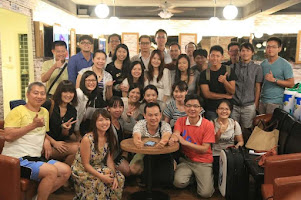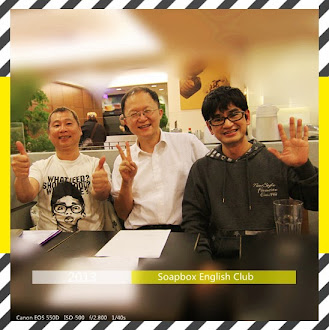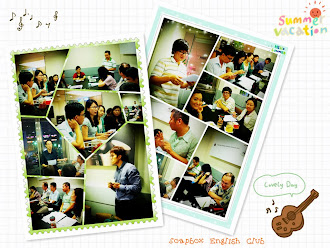 通知 周五原地點: 麥當勞
通知 周五原地點: 麥當勞
請注意! 改到怡客咖啡 Ikari Coffee
新北市板橋區文化路2段311號
板南線江子翠捷運站2號出口旁
每周五晚上7:00~9:30
0976-217-450 22540821 25556076
各位會員朋友們:
2013年5月24日將討論兩主題---

周五 5/24 1. 改變壞習慣2.精神問題增加
改變壞習慣
How to get rid of your bad habits (justasktom.com)
Habits get a ‘bad’ name when those dispositions to act in a certain way have negative effects on you and others. Consistently being late for meetings, for example, becomes a bad habit when your reputation is damaged and those with whom you are scheduled to meet are adversely affected. Getting rid of bad habits is rarely a straightforward process. If bad habits - smoking, procrastination, perfectionism, gambling, time-wasting, and the like - are getting in the way of the achievement of your life and career goals, here are some key considerations...
1. Decide which habits you seriously want to change.
Acknowledging that you have bad habits because others say so won’t change you for the better in the long term. Through embarrassment, you may clean up your messy desk because your colleague comments on it, but it will soon get messy again unless you change your behaviour. Ultimately, you will be the one who has to decide whether or not you want to change, and you’ll need dedication to the task. If commitment is lacking, the bad habit will persist.
2. Work on changing only one habit at a time.
From personal knowledge, together with feedback from colleagues, critics, and friends, you will doubtless know your bad habits - taking too long on the telephone, doing too many things at once, nail-biting, being reluctant to praise, speaking too quickly… Don’t try to change too many bad habits at once. Adopt the one-thing-at-a-time approach and remember that ‘the way to change begins with the first step’.
3. Analyse your bad habit and find your reasons for having it
Removing some bad habits will involve considerable effort and is likely to require you to explore the issues related to the entrenched behaviour. Suppose, as an example, you have a reputation for ‘never being on time for meetings’. To tackle this bad habit, you may need to:
•Identify any patterns associated with your continued lateness: Are you late for all meetings? Are you late only for those meetings you really don’t want to attend? Are you late only for afternoon meetings?
•Consider if you are personally responsible: Do you give in to the temptation to take, or make, that extra phonecall before leaving for meetings? Do you back your meetings against each other with no adequate break between them? Do you always arrive late because you have long business lunches? Do you simply give yourself insufficient time to get to meetings?
Questions:
1. How to get rid of bad habits?
2. How to form a good habit?
3. What are the habits that make people successful? (ex. good cleaning habits)
4. What are the bad habits that can hold you back and harm your career?
5. What are the habits of Remarkably Successful People formed?
6. Is being late a bad habit?
精神問題增加

Mental disorders double in Taiwan
(By Indo Asian News Service)
A research team has found the prevalence of common mental disorders (CMDs) in Taiwan has doubled over the last two decades, Xinhua reported.
It said the common mental disorders are a broad diagnostic category of non-psychotic depressive and anxiety disorders that account for over 90 percent of all mental disorders.
Being female, unemployed or underemployed, unmarried and under-educated present increased risk factors for developing CMDs. It has also been proposed that economic instability and income inequality may increase the risk for mental disorders, the release added.
The study suggests that the significant trend in the increase in rates of CMDs may be at least partly due to macro-social changes, including the continued decline in the employment market and the ongoing global economic recession.
Andrew Tai-Ann Cheng, the study leader, said the research not only highlighted the need to implement effective clinical and social preventative measures to promote mental health, but also the effects of uncertainty on mental health.
A sense of insecurity, much like that seen in response to losing a job, can negatively impact mental health, he added.
Questions:
1. What are your opinions about mental disorders double in Taiwan?
2. Do you believe that unemployed or unmarried increased risk factors for developing CMDs?
3. Mental health: what's normal, what's not?
How to tell someone they have a mental illness?
4. Is mental illness inherited?
5. How to help someone with a mental illness?
6. What you think about unemployment rate in Taiwan?
心靈海嘯! 精神健康創四年來新低 (聯合新聞網 )
就在勞委會公布明年第一季廠商人力需求創三年新低之際,一項針對國人精神健康的調查也發現,近半民眾對未來感到悲觀,且精神健康分數創下二○○八年金融海嘯以來新低。
這項調查的召集人、耕莘醫院精神科醫師楊聰財以「心靈海嘯」,形容這次調查結果。
調查發現,百分之十六點五的民眾對自己信心不足,且找不到解決方法,估計約兩百九十七萬人的「心理韌性」不夠強韌,至少超過九十五萬人的心靈非常脆弱。
這項兩年一次的調查由精神健康基金會執行,並分為心身健康、個人價值、生活掌握、家庭健康等四大指標。今年針對全台一千一百零八名成人調查發現,精神健康獲得八十一點六分,雖然仍在八十分及格邊緣,卻創下四年新低。
另外,國人無論在身心健康或生活掌握上,數據都比二○一○年退步;心身健康僅獲得七十九點三分,是自金融海嘯以來,首次滑落至不及格水準。統計顯示,每個五人就有兩人覺得沒有動力、心情不佳、記憶力退步、睡不好且感到煩躁。
這項調查也呼應中研院生物醫學科學研究所特聘研究員鄭泰安,發表在國際頂尖醫學期刊「刺胳針」(The Lancet)的研究。該篇研究證實,台灣精神疾病盛行率與失業率、離婚率及自殺率變化高度相關。
「國人精神健康狀況正處於低谷徘徊。」楊聰財表示,政經環境動盪不安影響民眾身心健康與對生活的控制感,台灣許多現況讓民眾感受更多壓力來源,不僅對個人,也對整體環境失去信心。他說,這是一種社會無望感,長期下去恐罹患憂鬱症。
儘管如此,調查也發現,民眾在個人價值與家庭健康層面的得分,是近四年來新高,顯示民眾仍覺得生命有意義,並能維持良好的家庭關係。
台大醫院精神科醫師胡海國說,個人與家庭仍是避免心靈海嘯吞噬的最佳方法,建議國人肯定自己,並維持良好家庭關係,耐心等待海嘯退去時機。




 名人名句5/23
名人名句5/23
The bywords of a loser are:I wish----
A winner says: I will
---Denis Waitley
失敗者常說: 我但願
成功者卻說: 我要!
(Billy 好句欣賞 大家共勉)
每周一句 5/23

 down-to-earth腳踏實地/實實在在--- sensible; practical; realistic
down-to-earth腳踏實地/實實在在--- sensible; practical; realistic
If something brings you back down to earth, it makes you face reality again after a pleasant experience, a hopeful dream or an unrealistic plan.
Examples:
Billy was sitting and daydreaming so his teacher told him to come down to earth and to do his homework.
比利坐著空想, 他老師要他實實在在地做作業。
My girlfriend said I am so unrealistic about things. She hope she'll meet someone who is more down-to-earth.
我女友說我非常不切實際,她希望找到實實在在的人。

























 Kevin 說芝麻糖 幫助黑髮
Kevin 說芝麻糖 幫助黑髮





